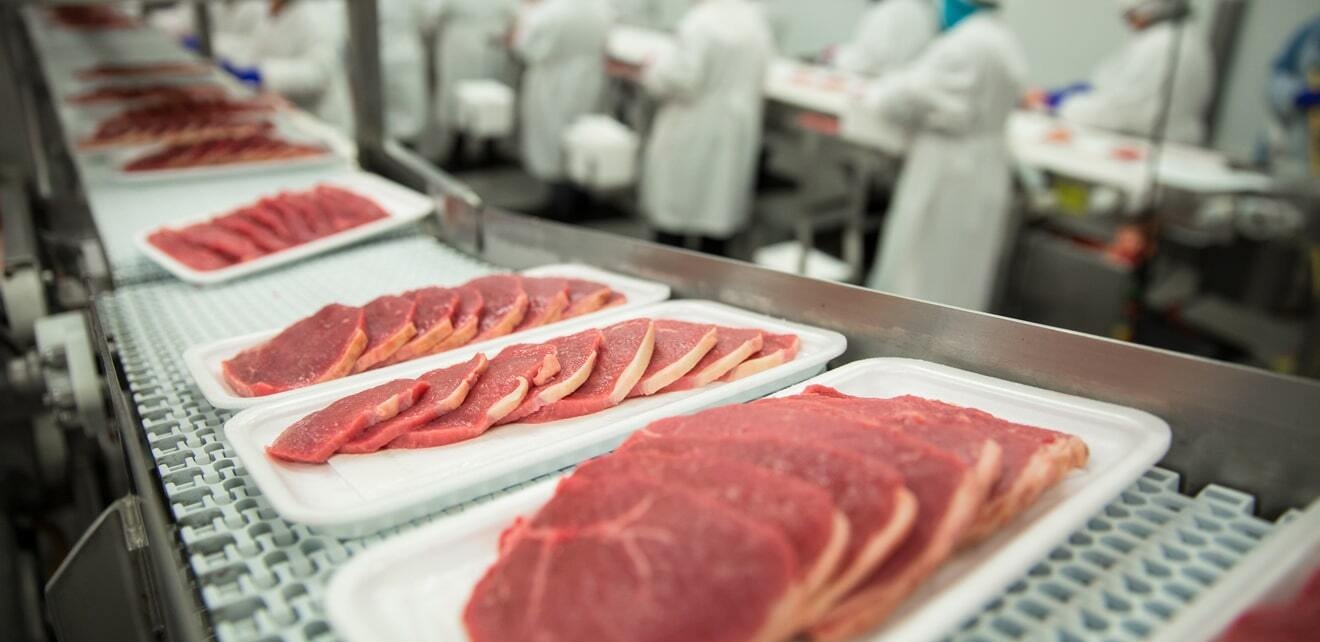Home > Blog
Read Time — 9 minutes
Building A Safer Food Supply Chain: The Importance Of Food Safety In Meat Processing

The meat processing industry is vital in our food supply chain, delivering protein-rich products to consumers worldwide. However, ensuring the safety of these products is paramount. Every step, from farm to fork, requires strict adherence to food safety standards.
Why are food safety standards so critical? Contaminated meat can lead to serious foodborne illnesses, causing harm to consumers and damaging public trust. Implementing rigorous quality control measures throughout the entire processing chain is essential. These measures not only safeguard consumer health but also demonstrate a commitment to regulatory compliance.
In this blog series, we'll delve deeper into food safety in meat processing. We'll explore essential best practices, the importance of certifications, and how technology can ensure product safety. We'll also discuss how ERP systems can be leveraged to streamline compliance efforts and maintain a robust food safety management system.
The high cost of cutting corners: Why food safety standards matter
The consequences of failing to implement proper food safety protocols in meat processing plants can be severe, impacting consumers, businesses, and the industry as a whole.
Expert quote:
"Food safety is a public health imperative. Consumers have the right to expect that the food they purchase is safe to eat."
– Tom Vilsack, Former US Secretary of Agriculture
Health risks: Contaminated meat can harbor harmful bacteria, viruses, and parasites, leading to serious foodborne illnesses. These illnesses can cause a range of symptoms, from mild discomfort to severe dehydration, hospitalization, and even death. Consumers trust meat processors to deliver safe products; a lapse in standards can have devastating consequences.
The Centers for Disease Control and Prevention (CDC) provides a wealth of information on foodborne diseases, including statistics on illness rates, common pathogens, and prevention tips.
Reputational damage: News of a foodborne illness outbreak linked to a meat processing plant can spread quickly, causing significant reputational damage. Consumers lose trust in the brand, sales plummet, and rebuilding a positive image can be a long and arduous process.
A Pew Research Center report explores consumer attitudes toward food safety and the impact of outbreaks on trust in the food industry.
Legal consequences: Regulatory bodies take food safety violations very seriously. Non-compliance can result in hefty fines, product recalls, plant closures, and even criminal charges. These legal ramifications can cripple a business financially and lead to long-term operational disruptions.
The FDA website maintains a searchable database of food recalls and withdrawals, allowing you to find specific examples of the consequences of food safety lapses.
The benefits of putting safety first: Fortunately, the benefits of implementing robust food safety protocols are numerous:
- Consumer safety: Ensuring safe meat products protects consumers from the threat of foodborne illnesses, fostering trust and brand loyalty.
- Regulatory compliance: By adhering to food safety standards, meat processors avoid non-compliance's legal and financial repercussions.
- Operational efficiency: Streamlined quality control procedures lead to fewer disruptions and recalls, improving overall operational efficiency.
- Cost savings: Avoiding costly product recalls and legal battles translates to significant cost savings for meat processing companies.
Investing in robust food safety measures is an ethical imperative and a smart business decision. By prioritizing consumer safety and regulatory compliance, meat processors ensure long-term success and build trust with the communities they serve.

Building a wall of defense: Best practices for food safety in meat processing
Ensuring food safety in meat processing requires a multi-pronged approach. Implementing these best practices forms the backbone of a powerful food safety program:
Hygiene and sanitation: Maintaining a clean and sanitary environment is crucial. This includes regularly cleaning and disinfecting all equipment, surfaces, and utensils. Employees should adhere to strict handwashing protocols and wear appropriate protective gear like gloves and hairnets.
Staff training and education: Equipping employees with the knowledge and skills to handle meat safely is essential. Training programs should cover sanitation procedures, hazard identification, and proper handling techniques. Regularly updated training ensures employees stay informed about the latest best practices.
Standard Operating Procedures (SOPs): Clearly defined SOPs outline every step of the processing chain, from receiving raw materials to finished products. SOPs ensure consistency and minimize the risk of errors. Employees should be thoroughly familiar with the SOPs relevant to their role and follow them meticulously.
Risk assessment: Meat processors should conduct thorough risk assessments, identifying potential contamination points throughout the processing chain. Implementing preventive controls like temperature control, metal detection, and proper storage helps mitigate these risks.
When implemented effectively, these best practices create a multi-layered defense system, safeguarding food safety at every stage of the processing journey.
Navigating the maze: Regulations and certifications in meat processing
The meat processing industry operates within a framework of national and local regulations designed to ensure food safety. Understanding and complying with these regulations is necessary.
Regulatory landscape
- National regulations: The United States Department of Agriculture's Food Safety and Inspection Service (USDA-FSIS) is the primary federal agency responsible for ensuring the safety of meat and poultry products. FSIS sets forth detailed regulations encompassing sanitation, hazard analysis, and product labeling.
- Local regulations: State and local authorities may also have additional food safety regulations that meat processors must adhere to.
A key element of regulatory compliance is implementing a Hazard Analysis and Critical Control Points (HACCP) plan. The HACCP approach, mandated by the FDA for all juice and seafood processors, is also highly recommended for meat processing facilities.
HACCP explained
HACCP is a proactive, science-based system that identifies, evaluates, and controls potential hazards throughout the food processing chain. The HACCP plan outlines:
- Hazard analysis: Identifying potential biological, chemical, and physical hazards that could contaminate meat products at various processing stages.
- Critical Control Points (CCPs): Pinpointing the processing chain where controls can be implemented to prevent, eliminate, or reduce identified hazards to acceptable levels.
- Monitoring procedures: Establishing methods to ensure CCPs are effectively managed, and deviations are detected and addressed promptly.
- Corrective actions: Defining actions to be taken when deviations from CCPs occur to prevent contaminated products from reaching consumers.
- Verification Procedures: Conducting ongoing verification activities to ensure the effectiveness of the HACCP plan.
By implementing a HACCP plan, meat processors can demonstrate their commitment to food safety and minimize the risk of contamination. For more information, explore the USDA’s Agricultural Service, which offers a clear explanation of principles and implementations.

Safeguarding our plates: A shared responsibility for food safety
Food safety is a joint effort requiring collaboration between governments, industry, and consumers. Each party plays a crucial role in upholding the highest standards:
- Government regulation: Regulatory bodies like the USDA-FSIS set comprehensive food safety regulations, conduct inspections, and enforce compliance measures. Ongoing research into potential hazards and best practices helps strengthen regulations over time.
- Industry commitment: Meat processors are primarily responsible for implementing robust food safety programs that adhere to regulations, utilizing HACCP plans, and investing in technologies that enhance product safety. Open communication with regulatory bodies and consumers fosters transparency and trust.
- Consumer awareness: Educated consumers play a vital role in protecting themselves. Understanding safe food handling practices at home, such as proper cooking temperatures and storage methods, is essential. Additionally, consumers can leverage information about food safety certifications and regulations to make informed purchasing decisions.
Building consumer trust through transparency
Maintaining consumer trust is paramount for the meat processing industry. Stringent and transparent safety standards are essential. Consumers want to be confident that the meat products they purchase have been processed according to rigorous safety protocols. Effective communication is also crucial. Openly discussing food safety measures, addressing concerns promptly, and providing clear information during product recalls build consumer confidence and strengthen brand reputation.
Bridging the compliance gap: How ERP systems empower meat processors
In today's complex regulatory landscape, food safety compliance can be daunting for meat processors. Fortunately, innovative technologies like Enterprise Resource Planning (ERP) systems offer powerful tools to streamline compliance efforts.
ERP systems: Champions of compliance
ERP systems act as a centralized hub, integrating all aspects of a meat processing operation. This translates to significant benefits for ensuring government compliance:
- Streamlined processes: ERP systems automate many manual quality control and data management tasks. This reduces the risk of human error and ensures consistent adherence to established procedures.
- Enhanced data tracking: ERP systems capture and store critical data related to every stage of the processing chain, from receiving raw materials to finished products. This comprehensive data trail facilitates traceability and simplifies the audit process. Regulatory bodies can easily track product movement and identify potential contamination sources in case of a recall.
- Integrated quality control: ERP systems can be configured to integrate seamlessly with quality control equipment and procedures. This allows for real-time monitoring of critical control points (CCPs) as outlined in HACCP plans. Deviations from established parameters trigger automatic alerts, enabling immediate corrective actions.
Deacom ERP: A tailored solution for meat processors
Deacom ERP goes beyond basic functionalities, offering features specifically designed to address the needs of the meat processing industry. Here's how Deacom empowers meat processors to excel in government compliance:
Built-in traceability tools: Deacom's powerful traceability features track ingredients and finished products throughout the entire supply chain. This level of detailed tracking facilitates swift and accurate recalls, minimizing potential risks and regulatory repercussions.
Automated labeling: Deacom automates the generation of compliant labels that adhere to government regulations. This eliminates human labeling errors and ensures that consumers receive accurate information.
Adherence to regulatory requirements: Deacom ERP is designed to comply with industry regulations, including FSIS requirements. This minimizes the risk of non-compliance and potential fines.
By leveraging the power of ERP systems, meat processors can streamline compliance efforts, reduce the risk of errors, and demonstrate a proactive commitment to food safety.

Guaranteeing a safe journey for your meat
As we now know, food safety is paramount in the meat processing industry. Throughout this blog series, we've explored the critical role of food safety standards in ensuring consumer trust and regulatory compliance.
Shared responsibility for safety
We learned that food safety is a collaborative effort. Governments set regulations, industry leaders implement best practices and utilize advanced technologies, and consumers play a vital role in safe food handling at home.
Building a culture of safety
Meat processors have a significant responsibility to uphold the highest safety standards. Implementing rigorous quality control measures, adhering to HACCP plans, and achieving certifications like SQF demonstrate a commitment to food safety excellence.
Technology as a powerful ally
Innovative technologies like ERP systems offer powerful tools for streamlining compliance, enhancing data tracking, and integrating quality control measures. Deacom ERP, specifically designed for the meat processing industry, provides features like automated labeling and robust traceability tools, empowering processors to confidently navigate the regulatory landscape.
The future of food safety
As technology continues to evolve, we can expect even more advancements in food safety for the meat processing industry. The ongoing efforts of industry leaders, coupled with cutting-edge technologies, offer a promising future for a safer and more transparent food supply chain.
By prioritizing food safety at every processing stage, the meat industry can continue to deliver high-quality products that consumers can trust.



